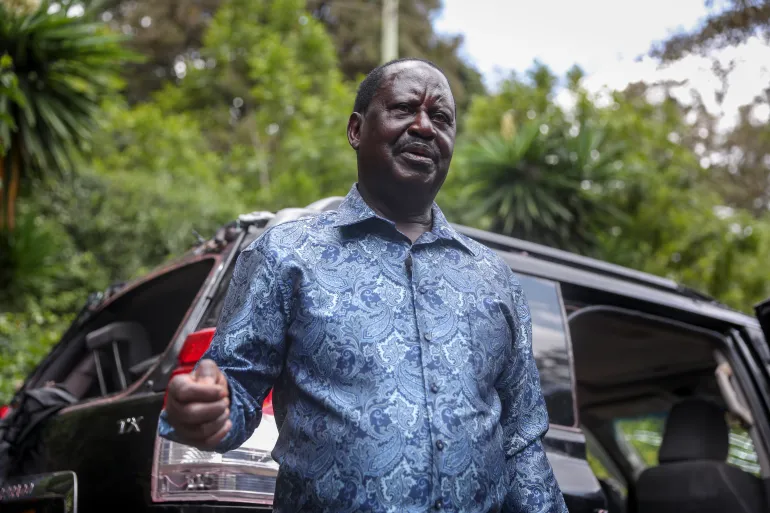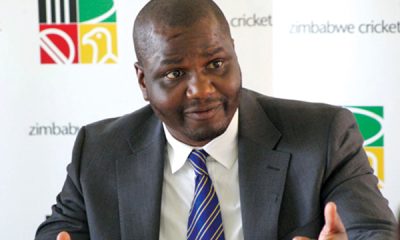World News
Kenya’s Veteran Opposition Leader Raila Odinga Dies at 80 While Receiving Treatment in India

Kenyan opposition leader and former prime minister Raila Odinga, one of Africa’s most influential political figures, has died at the age of 80 while undergoing medical treatment in India, officials have confirmed.
Hospital authorities at Devamatha Hospital in Kerala reported that Odinga suffered a fatal heart attack on Wednesday morning. Local police said he collapsed while on a morning walk accompanied by his sister, daughter, personal physician, and security personnel from both Kenya and India.
“He was rushed to a nearby private hospital, but was pronounced dead upon arrival,” said Krishnan M, the additional superintendent of police in Ernakulam, Kerala.
Officials in Odinga’s office also confirmed the death to multiple international media outlets. Indian newspaper Mathrubhumi earlier reported that Odinga had been receiving medical care in the coastal city of Kochi.
Born in 1945, Odinga was the son of Jaramogi Oginga Odinga, Kenya’s first vice president after independence in 1963. Over a political career spanning more than four decades, he became a symbol of opposition politics and pro-democracy movements across Africa.
Odinga’s passing leaves a major void in Kenya’s political landscape, particularly within the opposition, as the country heads toward the 2027 general elections.
Throughout his life, Odinga made five unsuccessful presidential bids — in 1997, 2007, 2013, 2017, and 2022 — each campaign strengthening his image as a resilient, if controversial, figure in Kenyan politics. His followers affectionately called him “Baba” (father in Swahili), while others referred to him as “Agwambo”, meaning “the mysterious one” in his native Luo language.
A fierce critic of one-party rule under President Daniel arap Moi, Odinga spent years behind bars for his alleged involvement in a 1982 coup attempt. Despite imprisonment and exile, he emerged as one of the key voices pushing for Kenya’s return to multiparty democracy in 1991.
He entered parliament in 1992 and later served as prime minister from 2008 to 2013, following a disputed 2007 election that sparked Kenya’s deadliest political violence since independence — leaving more than 1,300 people dead and displacing hundreds of thousands.
Odinga also played a central role in ushering in Kenya’s new constitution in 2010, which introduced sweeping reforms to decentralize power and strengthen checks on the executive.
News of Odinga’s death prompted an outpouring of grief in Kenya and beyond. President William Ruto visited the Odinga family home in Karen, Nairobi, where hundreds of mourners gathered, some waving tree branches in traditional mourning rituals.
Former President Uhuru Kenyatta, who once opposed Odinga before backing his 2022 presidential run, hailed him as “a father to the nation, a steadfast champion of the people, and a true son of Kenya.”
“His legacy lies not only in the political battles he fought but also in the peace he helped build. It is woven into the very fabric of our nation,” Kenyatta said.
Tanzanian President Samia Suluhu Hassan described Odinga’s passing as “a tragedy not just for Kenya, but for Africa as a whole,” calling him “a visionary leader, a peacebuilder, and a unifier whose influence transcended borders.”
Indian Prime Minister Narendra Modi also paid tribute, calling Odinga “a towering statesman and cherished friend of India.”
Mahmoud Ali Youssouf, Chairperson of the African Union Commission, praised him as “a steadfast advocate for democracy, justice, and people-centred governance whose legacy will continue to inspire generations of African leaders.”
Odinga’s decades-long fight for democracy and justice left an indelible mark on Kenya and the African continent. Even in his final years, he remained active in shaping national dialogue, most recently through a power-sharing pact with President Ruto that saw members of his Azimio la Umoja coalition appointed to key government positions.
As Kenya mourns the man many called “Baba,” his lifelong pursuit of democratic reform, equality, and unity remains a defining chapter in the country’s modern political history.
World News
Ramaphosa Says US Actions in Venezuela Violate International Law

South Africa has denounced recent actions by the United States in Venezuela, describing them as unlawful and calling for the unconditional release of Venezuelan President Nicolás Maduro and his wife.
President Cyril Ramaphosa said South Africa’s position is firmly rooted in respect for international law and the principles of the United Nations, arguing that Washington’s conduct threatens the sovereignty and territorial integrity of a UN member state.
Ramaphosa said Pretoria cannot support actions that undermine global legal norms, stressing that South Africa aligns itself with the Venezuelan people rather than external interference.
By taking this stance, South Africa has joined a number of countries openly questioning US policy toward Caracas, presenting the issue as one of legality and international order rather than power politics.
The President warned that ignoring sovereignty weakens the credibility of the international system and sets a dangerous precedent for global relations.
Pretoria has further urged the United Nations Security Council to act decisively within its mandate to preserve peace, protect international law and prevent escalation.
South Africa’s call reinforces its long-standing view that the Venezuelan situation should be resolved through multilateral engagement and dialogue, not unilateral measures a position likely to deepen diplomatic divisions between Washington and several nations in the Global South.
World News
US Capture of Maduro Triggers International Backlash

- Maduro and Wife Plead Not Guilty in New York Court to Narco-Terrorism Charges
- Trump Says US Will ‘Run’ Venezuela Temporarily; Allies Criticise Action at UN
- Operation Involved Pre-Dawn Strikes on Caracas, Dozens Reported Killed
Venezuelan President Nicolás Maduro and his wife, Cilia Flores, pleaded not guilty Monday to U.S. charges of narco-terrorism, drug trafficking and related crimes, two days after U.S. special forces captured them in a controversial military raid on Caracas that has drawn widespread global criticism.
Maduro, appearing handcuffed in a Manhattan federal courtroom, declared himself a “prisoner of war” and insisted, “I am innocent. I am a decent man, the president of my country.”
His wife also entered a not guilty plea.
The couple faces potential life sentences if convicted on allegations of flooding the U.S. with cocaine through ties to drug cartels.
The operation, confirmed by President Donald Trump as a “large-scale strike,” involved elite U.S. units, including Delta Force, and airstrikes that reportedly killed dozens, including civilians and security personnel.
Trump praised the mission as a “brilliant operation” and stated the U.S. would temporarily “run” Venezuela to oversee its vast oil reserves and facilitate a transition.pbs.org
International reaction was swift and largely negative. At an emergency UN Security Council meeting, even U.S. allies condemned the action as a violation of sovereignty and international law.
Venezuela’s UN ambassador accused Washington of an “illegal armed attack,” while protesters rallied in cities worldwide against the raid.
In Caracas, Vice President Delcy Rodríguez was sworn in as interim leader, denouncing the “kidnapping” but signalling openness to dialogue.
Maduro’s defence team vowed to challenge the legality of his capture, citing head-of-state immunity.
The indictment, unsealed after the raid, accuses Maduro of leading a corrupt regime tied to massive cocaine trafficking since 1999.
U.S. officials justified the operation by deeming Maduro illegitimate following the disputed 2024 elections.
Legal experts questioned the raid’s compliance with international norms, comparing it to past U.S. actions but noting the unprecedented abduction of a sitting president without extradition.
The incident has heightened tensions in Latin America, with fears of broader implications for regional sovereignty and U.S. foreign policy under Trump.
World News
China’s AI Talent Engine Drives Global Innovation Edge

- China Produces 3.57 Million STEM Graduates Annually, Dwarfing U.S. Output
- Beijing Leads World in AI Patents and Research, Backed by Massive Talent Pipeline
- Experts Urge Open-Source AI to Prevent Dominance, Offer Lessons for Africa
China continues to solidify its position as a powerhouse in artificial intelligence, fueled by an unparalleled pipeline of STEM talent that far outpaces global rivals, according to recent data and expert analysis.
At the heart of this surge is China’s massive annual output of STEM graduates.
Latest figures indicate the country produces approximately 3.57 million science, technology, engineering and mathematics graduates each year, representing about 40-45% of all university degrees.
This vast talent pool – roughly four times that of the United States’ 800,000 annual STEM graduates – provides the human capital driving breakthroughs in AI research, patents and applications.
Experts highlight that China’s STEM dominance extends to advanced degrees.
Projections indicate that Chinese universities will award over 77,000 STEM PhDs annually by 2025-2026, nearly double the U.S. figure of approximately 40,000. Within this, AI-specific expertise is growing rapidly, with China producing almost half of the world’s top AI researchers and leading in AI publications.
This talent advantage translates into tangible outputs. China now accounts for more than 70% of global AI patents, including a commanding share in generative AI, underscoring its strategic focus on open-source development and inclusive innovation.
Victor Gao, a prominent Chinese scholar interviewed at the Doha Forum, emphasised this approach in discussions on the AI revolution.
He warned against any single nation’s dominance, advocating for open-source AI to ensure global participation and prevent existential risks, such as AI surpassing human control.
“China’s model lowers barriers, allowing broader access and collaboration,” Gao said.
Despite challenges, including a projected shortage of millions of AI professionals by 2030 amid soaring demand, Beijing’s investments in education and research – including billions in semiconductor and AI funds – are bridging gaps and attracting global talent.
What Africa Can Learn from China’s AI Talent Strategy
As African nations seek to harness AI for development, China’s experience offers valuable insights for building sovereign capabilities in the technology.
With a youthful population of over 1.4 billion and emerging tech hubs in cities like Nairobi and Lagos, Africa has immense potential.
However, the continent produces an estimated 675,000 STEM graduates annually, a fraction of China’s output relative to population needs.
Experts recommend the following steps:
- Massive Investment in STEM Education — Emulate China’s focus by expanding universities, vocational programs and scholarships to target 1 million annual STEM graduates by 2030, prioritising software engineering and AI.
- Develop Specialised AI Pipelines — Establish centres of excellence and partnerships with Chinese institutions for knowledge transfer, aiming for tens of thousands of AI specialists.
- Promote Open-Source Adoption — Leverage affordable Chinese AI frameworks to address local issues like agriculture and healthcare, fostering innovation without dependency.
- Strengthen Ethical Governance — Create national AI strategies emphasising privacy and fairness to protect sovereignty amid global competition.
- Build Strategic Partnerships — Use forums like the Forum on China-Africa Cooperation to secure infrastructure investments while prioritising local capacity-building.
- By adapting these lessons, Africa can transition from AI consumer to contributor, driving equitable growth in the intelligence age.
- China’s AI ascent demonstrates that strategic talent development can reshape global dynamics. For emerging regions like Africa, the path forward lies in proactive investment and collaboration to ensure technology serves inclusive progress.
-

 Current Affairs2 months ago
Current Affairs2 months agoOperation restore order
-

 Crime and Courts3 months ago
Crime and Courts3 months agoMasasi High School Abuse Scandal Sparks Public Outcry
-

 Crime and Courts4 months ago
Crime and Courts4 months agoKuwadzana Man Jailed for Reckless Driving and Driving Without a Licence
-

 Current Affairs5 months ago
Current Affairs5 months agoBreaking: ZIMSEC June 2025 Exam Results Now Available Online
-

 Current Affairs4 months ago
Current Affairs4 months agoMunhumutapa Day: Zimbabwe’s Newest Public Holiday Set for Annual Observance
-

 Current Affairs3 months ago
Current Affairs3 months agoBREAKING NEWS: ZANU PF Director General Ezekiel Zabanyana Fired
-

 Current Affairs5 months ago
Current Affairs5 months agoNo Racism in Our Cricket: Government
-

 Current Affairs4 months ago
Current Affairs4 months agoGovernment Bans Tinted Car Windows in Nationwide Crime Crackdown



